South Africa
After 30 years of dominating South African politics, the ruling African National Congress will face its toughest election Wednesday as most opinion polls predict it will lose its parliamentary majority for the first time.
President Cyril Ramaphosa hopes the May 29 ballot will lead to his reelection. But if the ANC does lose its majority, it will force it into a coalition to form a government — also a first for the country and something that may complicate policymaking in Africa's most advanced economy.
"Here we have again in 2024, in the middle of an election season, this MK (Jacob Zuma's party) breakaway. And I think that has put the ANC under a lot more pressure, because it's a lot harder for them to know exactly where the chips will fall," said political analyst Tessa Dooms.
Ramaphosa was a senior figure in the ANC in the early 1990s and was once seen as a protege of Mandela. He left politics to become a successful businessman before returning as deputy president of South Africa in 2014. He became president in 2018 after Jacob Zuma resigned under a cloud of corruption allegations.
Ramaphosa has tried to rebuild the reputation of the ANC by cracking down on government graft. However, unemployment has risen to 32% during his presidency — the highest in the world — while he has struggled to curb poverty.
An electricity crisis has led to power outages across the country of 62 million due to failures at the state-run electricity supplier. It badly damaged the economy and Ramaphosa's reputation as someone who could fix South Africa's problems, even if the blackouts are viewed as a result of mismanagement during the Zuma administration.
The ANC is still expected to win the largest share of votes, but if it receives less than 50% as predicted, it will need the help of coalition partners to reelect the 71-year-old Ramaphosa.
John Steenhuisen is the leader of the main opposition party, the Democratic Alliance.
"What we know about him is that, he's definitely a career politician in it for the long haul. But, whether or not he is, you know, going to be able to have the kind of mass appeal is the big question of this election," said Dooms.
The centrist DA has promised to “rescue” South Africa from what it says is the corruption and mismanagement of the ANC but has never come close to winning a national election. The DA won 22% in the last general election in 2019 to the ANC's 62%.
The DA entered a pre-election agreement with smaller opposition parties, hoping their combined vote might clinch a majority and remove the ANC. But they would all have to increase their share significantly and it's seen as unlikely.
The Economic Freedom Fighters (EFF) has risen rapidly to become South Africa's third biggest party in Parliament since it was formed in 2013 by Julius Malema, a former ANC youth leader who was expelled from the ruling party.
His fiery, far-left rhetoric has made the 43-year-old South Africa's most contentious politician but his message that the ANC has failed poor, Black South Africans has gained traction, especially with unemployed and disaffected young people.
Dooms said that this election has seen a more subdued Malema.
"The kind of gusto and bravado that we've seen from Malema before is not quite what we've seen in this election. There's been a lot more kind of a measured sense of Julius Malema showing up and a lot more community," added Dooms.
The EFF has called for the nationalisation of mines and the redistribution of land to poor Blacks.
Former President Zuma added a new dimension when he announced in December that he was turning his back on the ANC he once led and returning to politics with a new party.
Zuma's MK Party is not expected to challenge the top three, but it is expected to further erode the ANC's vote just as the ruling party faces its sternest election test. The 81-year-old former leader still commands support, especially in his home KwaZulu-Natal province.
"Jacob Zuma has probably been one of the most strategic politicians we've seen in the country. And his political acumen cannot be overstated," Dooms said.
His reemergence also raised security concerns for the election after his conviction for contempt of court and prison sentence in 2021 sparked a week of rioting and looting that led to the deaths of more than 350 people in the worst violence in South Africa since the troublesome last days of apartheid.




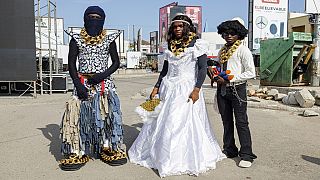
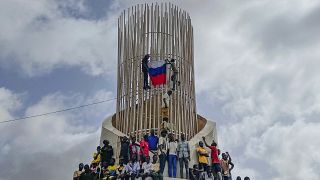
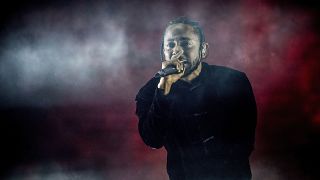
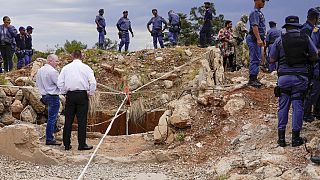
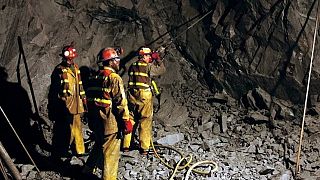
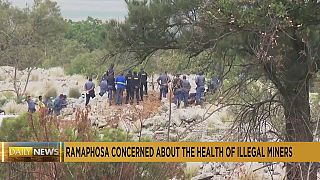
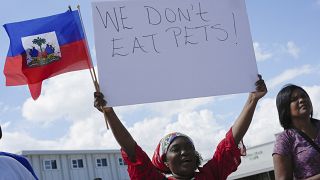
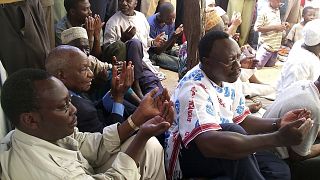
01:11
DRC: UDPS pushes for complete overhaul of 2006 constitution
01:16
Ugandan opposition politician kidnapped and jailed, his wife says
01:08
Mozambique: Opposition leader Venancio Mondlane faces legal action
02:18
Highly-anticipated Wicked makes its cinema debut in South Africa
01:14
World leaders gather in Brazil for G20 summit amid global tensions
01:00
Chidimma Adetshina crowned Miss Universe Africa and Oceania